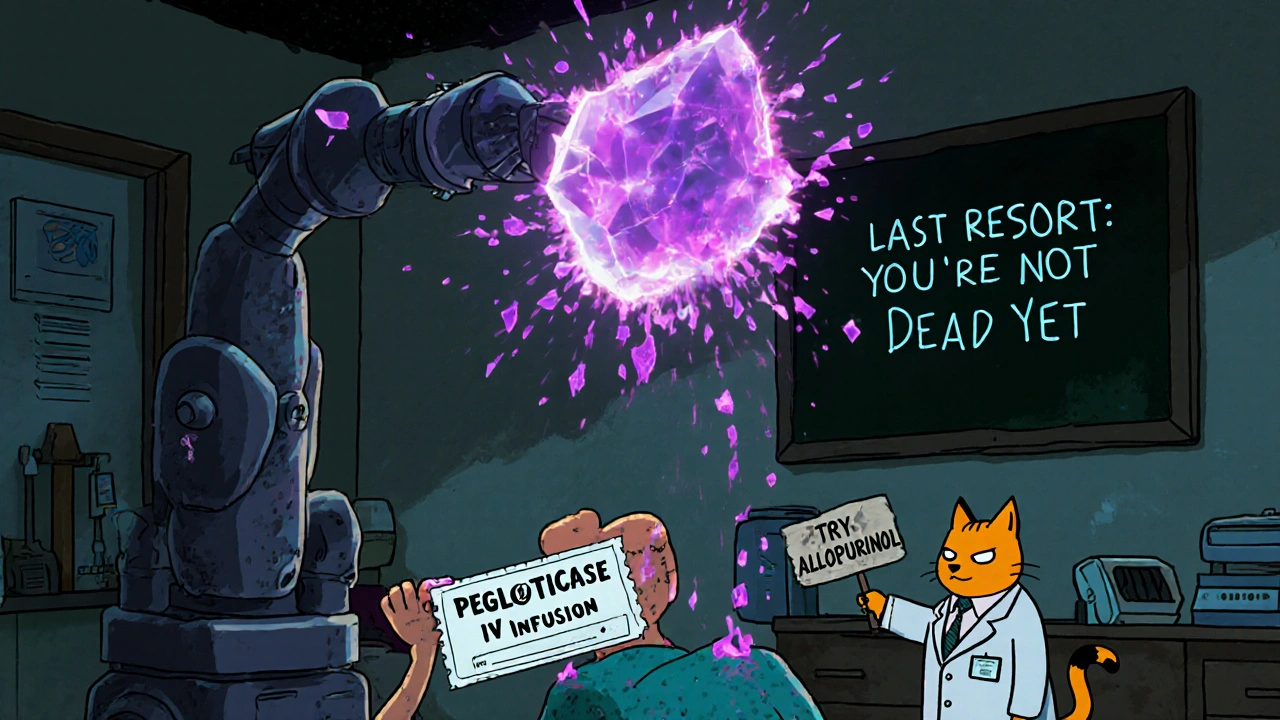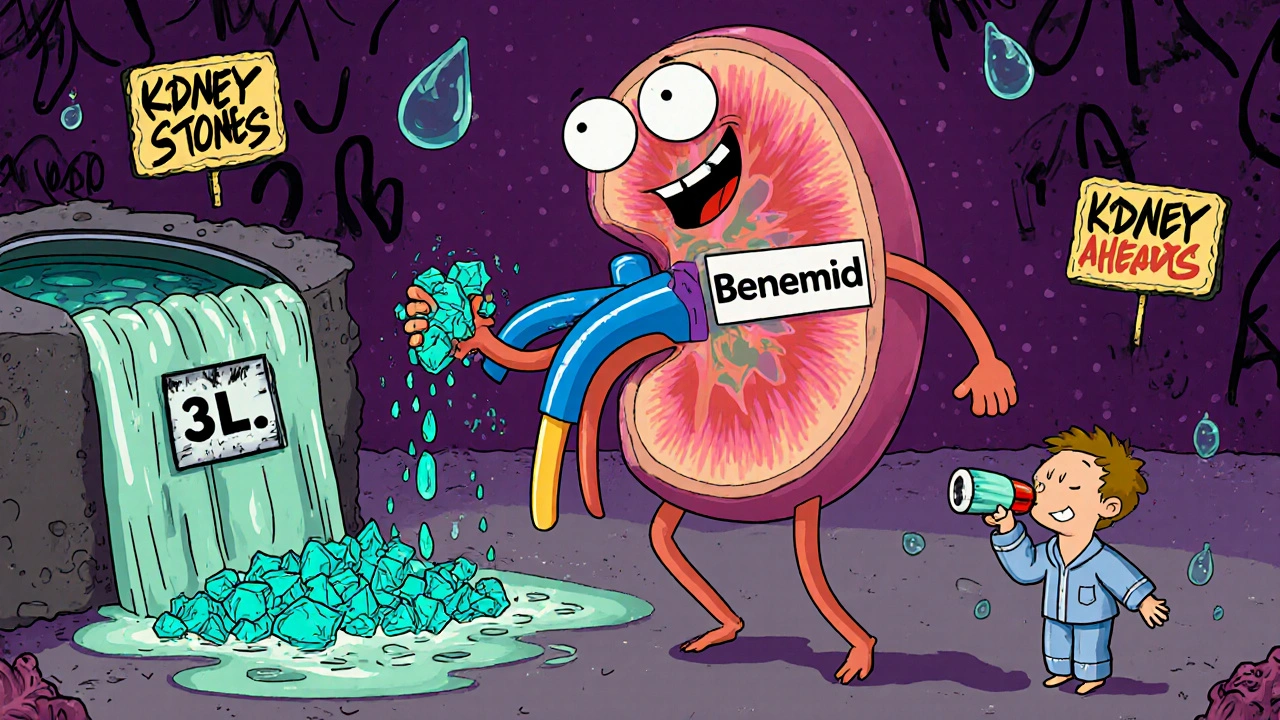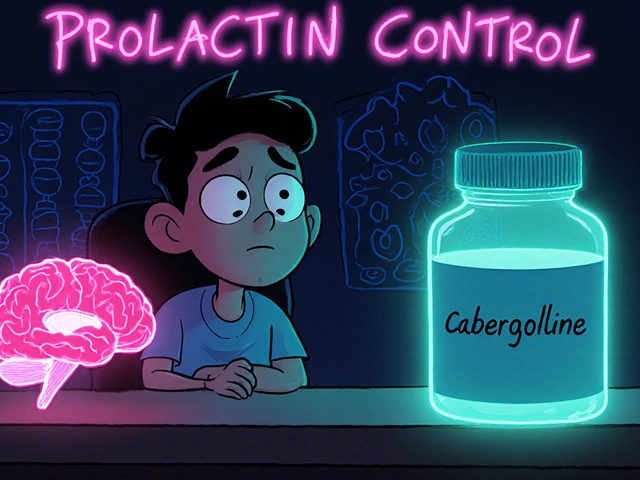Benemid (probenecid) has been used for decades to help manage gout by lowering uric acid levels in the blood. But it’s not the only option. If you’ve been prescribed Benemid and are wondering whether there are better, safer, or more convenient alternatives, you’re not alone. Many people on this medication ask the same thing: Is there something else that works just as well-or better-without the side effects?
How Benemid Actually Works
Benemid, or probenecid, is a uricosuric agent. That means it helps your kidneys flush out more uric acid through urine instead of letting it build up and form painful crystals in your joints. It doesn’t stop your body from making uric acid-it just helps you get rid of it faster.
This makes it useful for people who overproduce uric acid or have kidneys that don’t clear it well. It’s often used in long-term gout management, especially when someone can’t take allopurinol or febuxostat due to side effects or allergies. But it’s not a quick fix. You won’t feel relief during a gout flare. Benemid is for prevention, not pain control.
Typical doses range from 500 mg to 2,000 mg per day, split into two doses. You also need to drink plenty of water-often 2 to 3 liters daily-to avoid kidney stones, a common side effect. Many patients stop taking it because they find the water requirement too burdensome.
Common Alternatives to Benemid
There are three main classes of drugs used to lower uric acid long-term: xanthine oxidase inhibitors, uricosurics (like Benemid), and newer agents. Here’s how the top alternatives stack up.
Allopurinol: The First-Line Standard
Allopurinol is the most commonly prescribed drug for gout. Unlike Benemid, it doesn’t help your kidneys remove uric acid-it reduces how much your body makes in the first place. It’s cheaper, widely available, and has decades of safety data.
Studies show allopurinol reduces serum uric acid levels by 30-50% in most patients. It’s usually started at 100 mg per day and slowly increased until the target level (below 6 mg/dL) is reached. Many patients stay on it for life.
But it’s not perfect. About 2% of people develop a rare but serious skin reaction called allopurinol hypersensitivity syndrome, especially if they have the HLA-B*58:01 gene. That’s why some doctors test for this gene before prescribing, especially in people of Asian or African descent.
Febuxostat: For When Allopurinol Fails
Febuxostat (brand name Uloric) is another xanthine oxidase inhibitor, but it works differently than allopurinol. It’s often used when allopurinol doesn’t lower uric acid enough or causes side effects.
It’s more potent than allopurinol in some patients and doesn’t require dose adjustments for mild kidney problems. It’s taken as a 40 mg or 80 mg tablet once daily.
However, the FDA added a black box warning in 2019 after a study showed a higher risk of heart-related death compared to allopurinol. If you have heart disease or are at high risk, your doctor may avoid febuxostat. It’s also more expensive than allopurinol.
Lesinurad: A Combination Option
Lesinurad (Zurampic) is a newer uricosuric drug, similar to Benemid. But it’s not sold alone-it’s only approved to be taken with allopurinol or febuxostat. It’s designed to boost the effect of those drugs when they’re not enough on their own.
It works by blocking a specific transporter in the kidneys that reabsorbs uric acid. This lets more of it leave the body. In clinical trials, adding lesinurad to allopurinol helped 60% of patients reach their target uric acid level, compared to 45% on allopurinol alone.
The catch? Lesinurad increases the risk of kidney problems, including kidney stones and acute kidney injury. You need to take it with food and drink at least 2 liters of water daily. It’s also costly and rarely used unless other options have failed.
Probenecid vs. Pegloticase: For Severe, Treatment-Resistant Gout
If you’ve tried everything and still have frequent flares and tophi (uric acid lumps under the skin), your doctor might consider pegloticase (Krystexxa). This isn’t a pill-it’s an IV infusion given every two weeks.
Pegloticase breaks down uric acid into a substance your body can easily eliminate. It’s powerful: studies show it normalizes uric acid in over 40% of patients after six months. But it’s reserved for extreme cases because of serious risks: severe allergic reactions, infusion reactions, and the possibility of losing effectiveness over time.
It’s not a replacement for Benemid-it’s a last-resort option. Most people never need it.
Comparison Table: Benemid vs. Top Alternatives
| Drug | Class | Dose | How It Works | Best For | Key Risks |
|---|---|---|---|---|---|
| Benemid (probenecid) | Uricosuric | 500-2000 mg/day in 2 doses | Increases uric acid excretion through kidneys | Patients who overproduce uric acid, cannot tolerate allopurinol | Kidney stones, need for high water intake, nausea |
| Allopurinol | Xanthine oxidase inhibitor | 100-800 mg/day | Reduces uric acid production | First-line for most gout patients | Skin rash, hypersensitivity syndrome (rare), kidney dose adjustment needed |
| Febuxostat | Xanthine oxidase inhibitor | 40-80 mg/day | Reduces uric acid production | Patients who can’t take allopurinol | Higher heart risk, more expensive |
| Lesinurad | Uricosuric | 200 mg/day with allopurinol or febuxostat | Blocks uric acid reabsorption in kidneys | Patients not reaching target on allopurinol alone | Kidney injury, stones, must drink 2L+ water |
| Pegloticase | Enzyme therapy | 8 mg IV every 2 weeks | Breaks down uric acid into allantoin | Severe, treatment-resistant gout with tophi | Severe allergic reactions, infusion reactions, loss of response |

Who Should Avoid Benemid?
Benemid isn’t right for everyone. You should avoid it if:
- You have kidney stones or a history of them
- Your kidney function is already low (eGFR below 50 mL/min)
- You’re allergic to sulfa drugs (probenecid is a sulfa derivative)
- You’re taking aspirin regularly (even low-dose) - it blocks probenecid’s effect
- You can’t drink 2-3 liters of water daily
Many patients stop Benemid because they forget to drink enough water. Others find the twice-daily dosing inconvenient. If you’re struggling with any of these, switching to allopurinol might be simpler.
When Benemid Might Still Be the Best Choice
Even with newer options, Benemid has its place. It’s often chosen when:
- You’re under 50 and have no heart or kidney disease
- You’re producing too much uric acid (confirmed by a 24-hour urine test)
- You can’t take allopurinol due to a rash or intolerance
- You’re trying to avoid long-term use of a drug with heart risks (like febuxostat)
- You’re cost-sensitive-Benemid is usually cheaper than febuxostat or lesinurad
Some rheumatologists still prefer it for younger patients with no comorbidities because it’s been used safely for over 60 years. If you’re young, healthy, and willing to drink lots of water, it’s a solid option.
What About Natural Alternatives?
You might see online claims about cherry juice, vitamin C, or celery seed lowering uric acid. While some small studies suggest cherry extract may reduce flare frequency slightly, none of these are proven to replace medication.
Cherry juice might help reduce flares by 35% in some people, but it won’t get your uric acid below 6 mg/dL. Vitamin C has a tiny effect-about 0.5 mg/dL reduction. That’s not enough for gout control.
Don’t rely on supplements to replace your prescribed drug. They can be helpful extras, but not substitutes. If you’re thinking of stopping Benemid or switching to a natural remedy, talk to your doctor first.

How to Decide What’s Right for You
There’s no one-size-fits-all answer. Your best choice depends on:
- Your kidney function
- Whether you have heart disease
- Your uric acid production level (measured by urine test)
- Your ability to drink enough water
- Your budget and insurance coverage
- Your past reactions to medications
Start by asking your doctor for a 24-hour urine uric acid test. If you’re over-producing uric acid, allopurinol or febuxostat are likely better. If you’re under-excreting it, Benemid might still be ideal.
If cost is a concern, allopurinol is the cheapest and most effective for most people. If you’ve had a bad reaction to it, Benemid is often the next step. If you’re still having flares despite treatment, your doctor might add lesinurad or consider pegloticase.
Bottom Line
Benemid isn’t outdated-it’s just not for everyone. Allopurinol remains the go-to for most patients because it’s effective, cheap, and well-studied. Febuxostat is a good alternative if you can’t take allopurinol, but watch for heart risks. Lesinurad is a niche add-on, and pegloticase is for extreme cases.
If you’re on Benemid and struggling with water intake or side effects, talk to your doctor about switching. If you’re not on it yet and have gout, ask whether allopurinol might be a better fit. Your goal isn’t just to avoid flares-it’s to keep your uric acid low enough to dissolve existing crystals and prevent joint damage over time.
Medication is only part of the picture. Diet, weight, alcohol, and hydration matter too. But if you’re trying to control gout long-term, the right drug can make all the difference.
Can I take Benemid if I have kidney disease?
Benemid is not recommended if your kidney function is significantly reduced (eGFR below 50 mL/min). It relies on your kidneys to work properly. If your kidneys are weak, the drug won’t help clear uric acid, and you could build up dangerous levels of the medication in your body. Your doctor will likely choose allopurinol or febuxostat instead, adjusting the dose for kidney function.
Does Benemid cause weight gain?
No, Benemid itself doesn’t cause weight gain. But some people gain weight after starting gout treatment because they feel better and eat more freely. Weight gain can actually raise uric acid levels, so it’s important to maintain a healthy diet and stay active-even if you’re feeling better.
Can I drink alcohol while taking Benemid?
It’s best to avoid alcohol, especially beer and spirits. Alcohol increases uric acid production and reduces how much your kidneys clear it. Even moderate drinking can trigger gout flares. If you choose to drink, limit it to one drink occasionally and always stay well-hydrated.
How long does it take for Benemid to work?
Benemid doesn’t relieve pain during a gout flare. It works over weeks and months to lower uric acid levels in your blood. You may not feel any different at first. Doctors usually check your uric acid level after 2-4 weeks to see if the dose needs adjusting. Full protection from flares often takes 3-6 months.
Is Benemid safe for long-term use?
Yes, Benemid is safe for long-term use if your kidneys are healthy and you drink enough water. Many patients take it for years without problems. Regular blood and urine tests help your doctor monitor your kidney function and uric acid levels. If you develop kidney stones or your kidney function declines, your doctor will reassess your treatment.
Next Steps
If you’re currently on Benemid and having trouble with side effects or water intake, schedule a follow-up with your doctor. Ask for a uric acid blood test and consider a 24-hour urine test to see how your body handles uric acid.
If you’re not on any medication but have frequent gout flares, talk to your doctor about starting allopurinol. It’s the most proven, affordable, and widely used option.
Don’t switch medications on your own. Even small changes can trigger flares or cause side effects. Work with your doctor to find the best balance of effectiveness, safety, and convenience for your life.




Scott Dill
October 30, 2025 AT 06:35Man, I was on Benemid for a year and honestly? The water thing killed me. I’d forget and wake up with a kidney stone vibe. Switched to allopurinol and now I just take one pill, drink like normal, and my flares are way down. No more carrying a water bottle everywhere like it’s my job.
Also, why does everyone act like probenecid is some ancient wisdom? It’s just old. Allopurinol’s been around longer and works better for most people.
Arrieta Larsen
October 30, 2025 AT 23:33I’ve been on febuxostat for 3 years. My doctor said I’m at higher risk for heart issues, but my uric acid was stuck at 9.5. Now it’s 5.2. I don’t drink alcohol, I walk every day, and I avoid organ meats. It’s not perfect, but it’s working. Just don’t ignore the black box warning.
Mike Gordon
November 1, 2025 AT 10:31Lesinurad with allopurinol? That’s a combo I never thought I’d need. I had to try it after three years of allopurinol only hitting 6.8. Now I’m at 5.1. But wow, the water requirement is brutal. I drink 3L a day and still get weird lower back twinges. My nephrologist says it’s fine but I’m terrified of kidney damage. Maybe I’m just paranoid.
Also, why is this drug so expensive? Insurance barely covers it. Feels like they’re milking the niche market.
Kathy Pilkinton
November 1, 2025 AT 12:39People who say Benemid is "still valid" are either rich, young, and healthy-or they’ve never had to drink 3 liters of water every day while working a 12-hour shift. I’m a nurse. I don’t have time to pee every hour. Allopurinol is the only reasonable choice for working-class people. Stop romanticizing outdated meds.
And no, cherry juice won’t help. That’s not medicine, that’s TikTok advice.
Holly Dorger
November 1, 2025 AT 18:31I’m 68 and on allopurinol for 8 years. My doc tested me for HLA-B*58:01 before prescribing. Turned out negative. I’ve had zero issues. I drink water, avoid beer, and take my pill every night. Simple. Cheap. Works.
Benemid? Too many rules. Too much water. Too much hassle. If your doctor pushes it, ask why. Maybe they’re not up to date.
Amanda Nicolson
November 3, 2025 AT 17:52I tried everything. Benemid? Water torture. Allopurinol? Got the rash-felt like my skin was on fire. Febuxostat? My heart started acting weird. Then I got pegloticase. IV every two weeks. It’s scary as hell. First time I got the infusion, I cried. But now? My tophi are shrinking. I can wear shoes again. I didn’t think I’d ever walk without pain.
This isn’t a drug. It’s a lifeline. And yeah, it’s expensive. But if you’ve got to the point where you’re choosing between your feet and your insurance, you’ll do it. No regrets.
Jackson Olsen
November 4, 2025 AT 18:18Just started allopurinol. Doc said my uric acid was 8.4. Took 100mg. Two weeks later, 6.1. Still not perfect but way better. No side effects. No water obsession. Just a pill. Why would anyone choose Benemid? It’s like choosing a horse and buggy when Tesla’s right there.
Also, cherry juice? Nah. I drink it for taste, not medicine.
Penny Clark
November 5, 2025 AT 11:36So I switched from Benemid to allopurinol last month and my flares stopped… but I gained 8 lbs? 😅 Not sure if it’s the meds or just eating more because I’m not in pain anymore. I’m trying to walk more and cut back on pizza. Gout makes you feel like you’re on a diet forever. But now I can actually enjoy food without fear. That’s worth something.
Also, I use emojis now: 💧💊🚶♀️
Niki Tiki
November 7, 2025 AT 09:12Why are Americans so obsessed with pills? In India, they treat gout with diet and turmeric. Benemid? Allopurinol? You people are addicted to Big Pharma. Drink less beer. Eat less meat. Walk more. No pills needed. Your bodies are weak because you eat processed junk. Stop blaming the medicine and fix your lifestyle.
Also, I’m not paying $300 for a pill when my cousin in Delhi takes ginger tea and lives fine.
Jim Allen
November 9, 2025 AT 02:45Benemid is the philosophical choice. It doesn’t stop uric acid-it helps you let it go. Like life, man. You can’t control everything. Sometimes you just need to flush it out.
But also, I hate drinking water. So I switched to febuxostat. Now I’m just waiting for my heart to give out. At least I’m chill while I do it. 🤷♂️
Also, cherry juice is a scam. I tried it. Tasted like sadness.
Nate Girard
November 11, 2025 AT 01:49My dad’s on Benemid and he’s 72 with perfect kidneys. He drinks 3L of water daily, sets phone alarms, and carries a bottle everywhere. He says it’s worth it because he hasn’t had a flare in 5 years. He’s not young, but he’s disciplined. Maybe the real issue isn’t the drug-it’s whether you’re willing to do the work.
Also, I just started allopurinol. No flares in 6 weeks. I’m not drinking 3L a day. So… yeah. I’m glad I didn’t go with Benemid.
Carolyn Kiger
November 12, 2025 AT 00:41I’m a pharmacy tech. We sell tons of allopurinol. Benemid? Maybe 1 prescription a month. Most people can’t handle the water. Or they’re on aspirin. Or they have kidney issues. Allopurinol is the default for a reason.
Also, if you’re thinking about switching, ask your doctor for a 24-hour urine test. It’s not expensive. It tells you if you’re over-producing or under-excreting. That’s the real key-not what’s trendy.
krishna raut
November 13, 2025 AT 02:44Allopurinol is best. Cheap. Proven. Safe. Benemid needs good kidneys. Most Indians have kidney issues from diabetes. So allopurinol is standard here too. No need to overcomplicate.
Prakash pawar
November 13, 2025 AT 21:20You think you’re smart because you take a pill? Gout is a spiritual disease. Your body is crying out for balance. Benemid? Allopurinol? They’re just chemical band-aids. True healing comes from fasting, yoga, and silence. I haven’t taken a pill in 12 years. My uric acid? 4.1. My soul? At peace.
Also, the FDA is controlled by Pfizer. Don’t trust them. They want you dependent. Wake up.
And yes, I drink lemon water. It’s ancient wisdom.
MOLLY SURNO
November 15, 2025 AT 20:02While the pharmacological options are well-documented, the behavioral adherence factors-particularly hydration and dietary compliance-are often underestimated in clinical decision-making. A patient’s ability to maintain consistent fluid intake remains a critical determinant of therapeutic success with uricosuric agents, regardless of biochemical efficacy.
Alex Hundert
November 16, 2025 AT 19:04Just had my first pegloticase infusion. Felt like I was getting a superhero shot. Nervous? Yeah. But my tophi are shrinking. My big toe doesn’t hurt anymore. I’ll take a 10% chance of an allergic reaction if it means I can wear sneakers again.
Also, to the guy who said cherry juice works? You’re not wrong-it helps a little. But it won’t dissolve a tophus the size of a golf ball. This is real medicine. Don’t disrespect it.